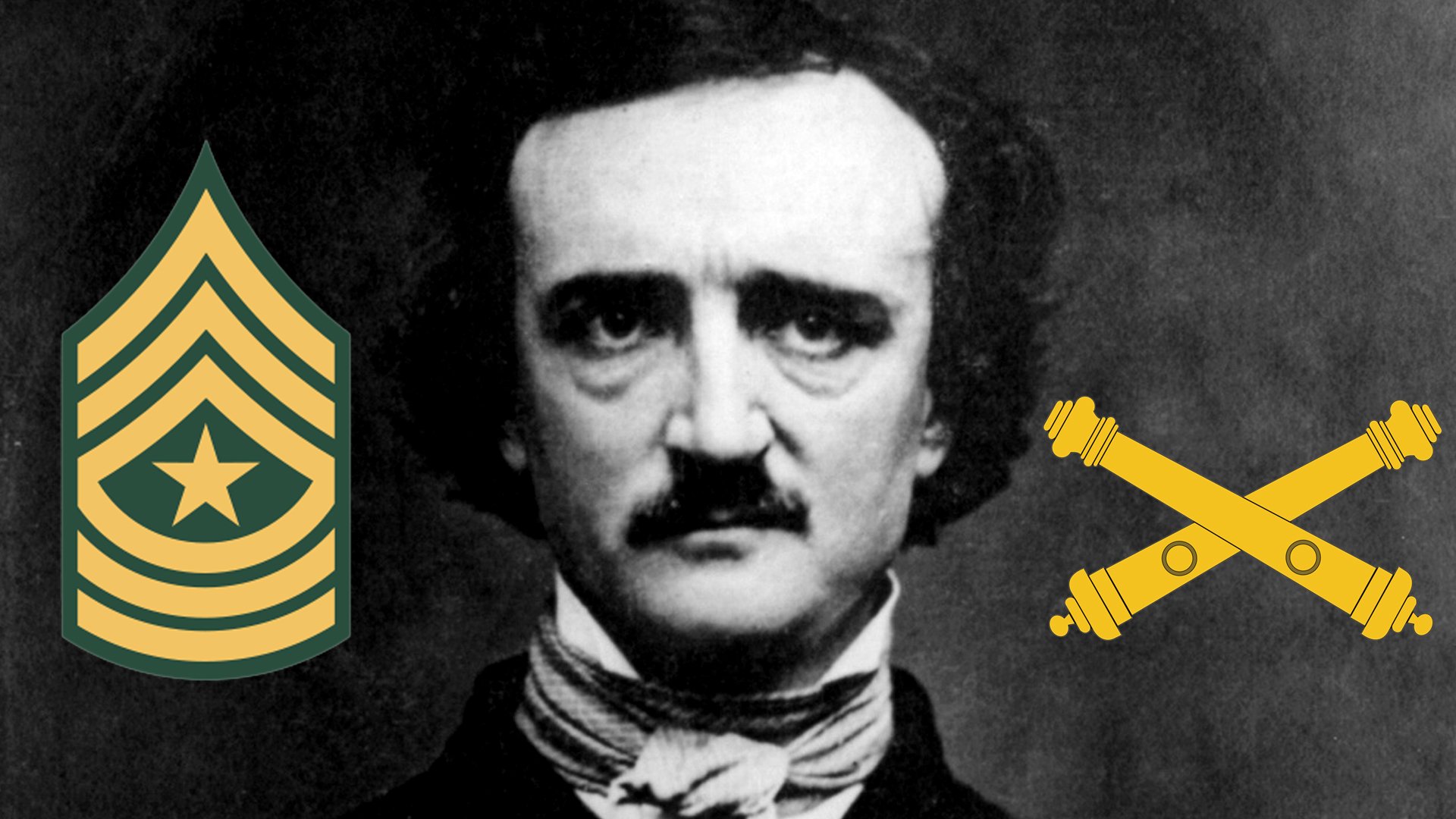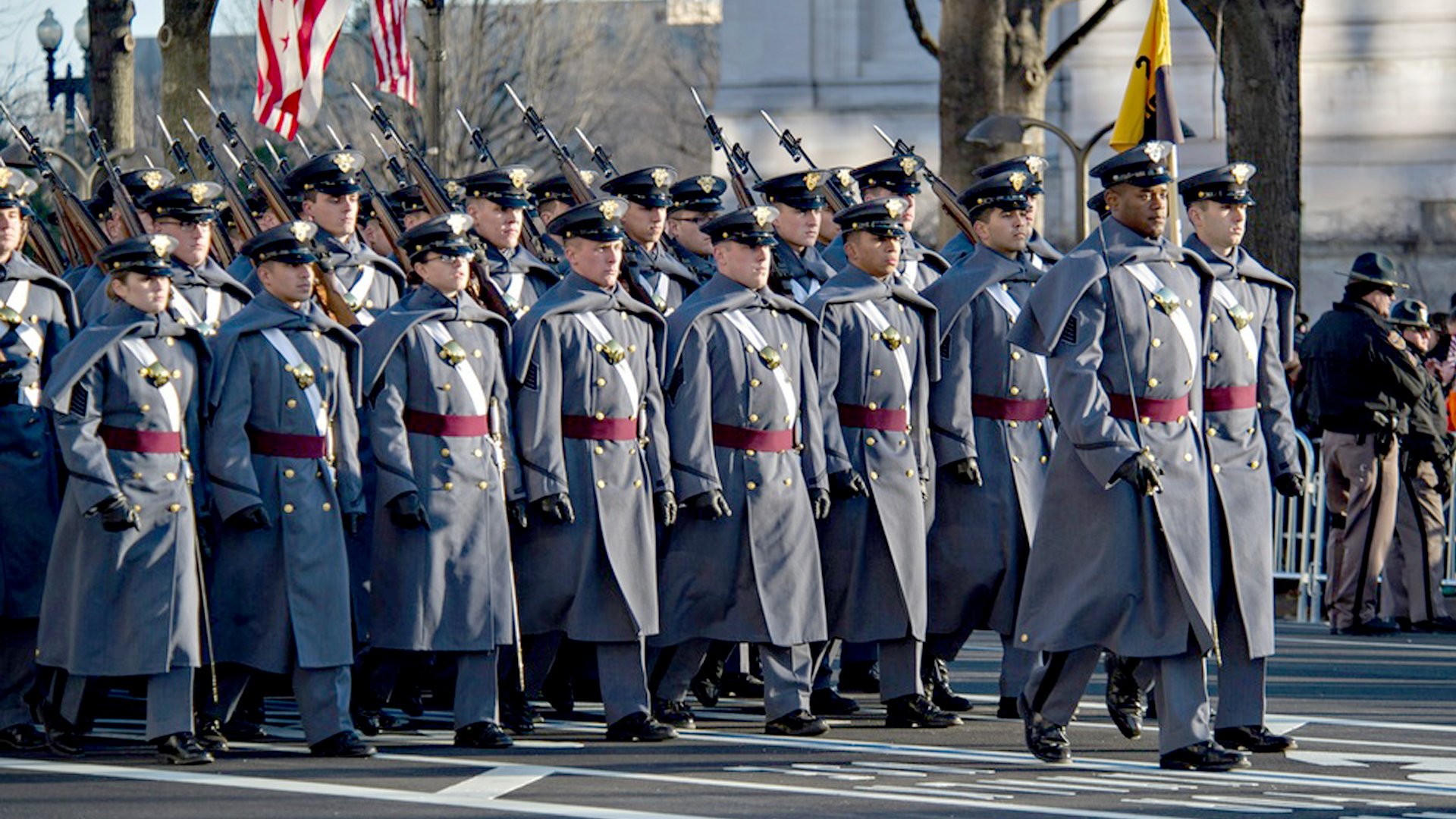
Before Edgar Allan Poe was a famous poet, he was a sergeant major in the US Army. Composite by Coffee or Die.
Few authors have been as influential as Edgar Allan Poe. He was not only a pioneer of Western literature, but he was also the first American to make a successful living as a writer. He penned famous detective stories long before the likes of Sherlock Holmes and Nancy Drew entered the scene. His dark poems, such as “The Raven” and “Annabelle Lee,” expanded the medium with their innovative constructions and dark themes. His short stories, such as “The Tell-Tale Heart” and “The Fall of the House of Usher,” remain the gold standard of Gothic literature. And his one and only novel, The Narrative of Arthur Gordon Pym of Nantucket, is credited with inspiring Herman Melville to write his masterpiece, Moby-Dick.
Of course, Poe will always be best known through his immense body work. Yet, his life off the page was just as bizarre and enthralling as any of his stories. It’s a complex biography, full of many twists and turns, the first – and perhaps most surprising – being Poe’s spectacularly brief tenure as a sergeant major in the United States Army.
Related: 3 Brilliant War Stories That Show Combat Through A Unique Lens
Edgar Allan Poe Attained the Highest Enlisted Rank
Before any of Poe’s work was published, he was a soldier. He enlisted in the Army in 1827 under the false name Edgar Perry. He also lied about his age, saying he was 22 when he was really only 18 years old, in order to meet the minimum age of enlistment at the time. Poe’s first posting was in Boston Harbor, where he earned $5 a day as an artilleryman. He used his meager salary to anonymously self-publish his first collection of poetry, Tamerlane and Other Poems. Only 50 copies were printed, and the collection failed to attract the interest of critics.

Poe was the first American to make a successful living as a writer. Photo by Mac Caltrider/Coffee or Die.
In just two years, Poe was promoted to the job of artificer: someone who prepares and handles explosives. He also attained the rank of sergeant major — the highest achievable rank for enlisted soldiers. Yet, despite all of his success in the Army, Poe didn’t envision himself as a career soldier. His true ambition was to be a successful author and poet.
Related: ‘Lovecraft’s Iraq’: Recon Marines Fight From Fallujah to the Mountains of Madness
Appointment to the United States Military Academy
Poe grew tired of living the hard life of an enlisted soldier. Clever man that he was, he devised a cunning plan to extricate himself from his predicament. In 1829, he confessed to his commanding officer that he had lied about his name and age in order to join the Army with the hope that the revelation would result in his enlistment contract being terminated. To help prod his commander toward that decision, Poe proposed that in exchange for an early discharge, he would commit to attending the United States Military Academy at West Point.
Poe’s proposition was accepted, and on April 15, 1829, he was officially discharged from the Army. After a brief stint in Baltimore, where he published a second, more successful collection of poetry, he traveled to New York and enrolled in West Point.

Cadets from the U.S. Military Academy at West Point march during the 57th Presidential Inauguration Parade along Pennsylvania Avenue starting at the U.S. Capitol to the White House in Washington, D.C., Jan. 21, 2013. US Army photo by Staff Sgt. Teddy Wade.
Apparently, life as a cadet was not what Poe had expected. So, once again, he hatched a plan to get himself booted from the ranks. This time, though, his quest for freedom would require a great deal of effort, as it turned out that getting kicked out of West Point wasn’t all that easy.
During his first semester, Poe accrued a staggering 44 offenses and 106 demerits. He ramped up his efforts at the start of his second semester, accruing 66 offenses in just one month. Legends abound about his shenanigans. They include stories of starting food fights, excessive drinking, and public nudity, like the time he apparently showed up to formation wearing nothing except for a cartridge belt. According to one myth, he even murdered somebody (a theory explored in Netflix’s new mystery thriller film, The Pale Blue Eye).

Harry Melling (right) stars as Edgar Allan Poe in Netflix's The Pale Blue Eye. Screenshot from The Pale Blue Eye.
Are any of those crazy stories true? Maybe. But, more likely, the truth is that Poe skipped a lot of classes until he was court-martialed. In early 1831, he was expelled from West Point for “gross neglect of duty” and “disobedience of orders.”
A Sudden and Mysterious Death
Finally unshackled from the fetters of military service, Poe picked up a goose-quill pen and got to work. He dedicated the remainder of his life to his craft as a poet and storyteller, becoming one of the first Americans to make a living entirely through writing. Then, at the age of 40, he died unexpectedly.
To this day, the circumstances surrounding the death of Edgar Allan Poe remain shrouded in mystery. On October 3, 1849, he was found lying in a Baltimore gutter, delirious and dressed in someone else’s clothing. He died four days later, having never recovered enough to tell anyone what had happened.
Read Next: Before Stephen King, America’s ‘King of Horror’ Was A Civil War Veteran With TBI

Mac Caltrider is a senior staff writer for Coffee or Die Magazine. He served in the US Marine Corps and is a former police officer. Caltrider earned his bachelor’s degree in history and now reads anything he can get his hands on. He is also the creator of Pipes & Pages, a site intended to increase readership among enlisted troops. Caltrider spends most of his time reading, writing, and waging a one-man war against premature hair loss.
BRCC and Bad Moon Print Press team up for an exclusive, limited-edition T-shirt design!
BRCC partners with Team Room Design for an exclusive T-shirt release!
Thirty Seconds Out has partnered with BRCC for an exclusive shirt design invoking the God of Winter.
Lucas O'Hara of Grizzly Forge has teamed up with BRCC for a badass, exclusive Shirt Club T-shirt design featuring his most popular knife and tiomahawk.
Coffee or Die sits down with one of the graphic designers behind Black Rifle Coffee's signature look and vibe.
Biden will award the Medal of Honor to a Vietnam War Army helicopter pilot who risked his life to save a reconnaissance team from almost certain death.
Ever wonder how much Jack Mandaville would f*ck sh*t up if he went back in time? The American Revolution didn't even see him coming.
A nearly 200-year-old West Point time capsule that at first appeared to yield little more than dust contains hidden treasure, the US Military Academy said.












